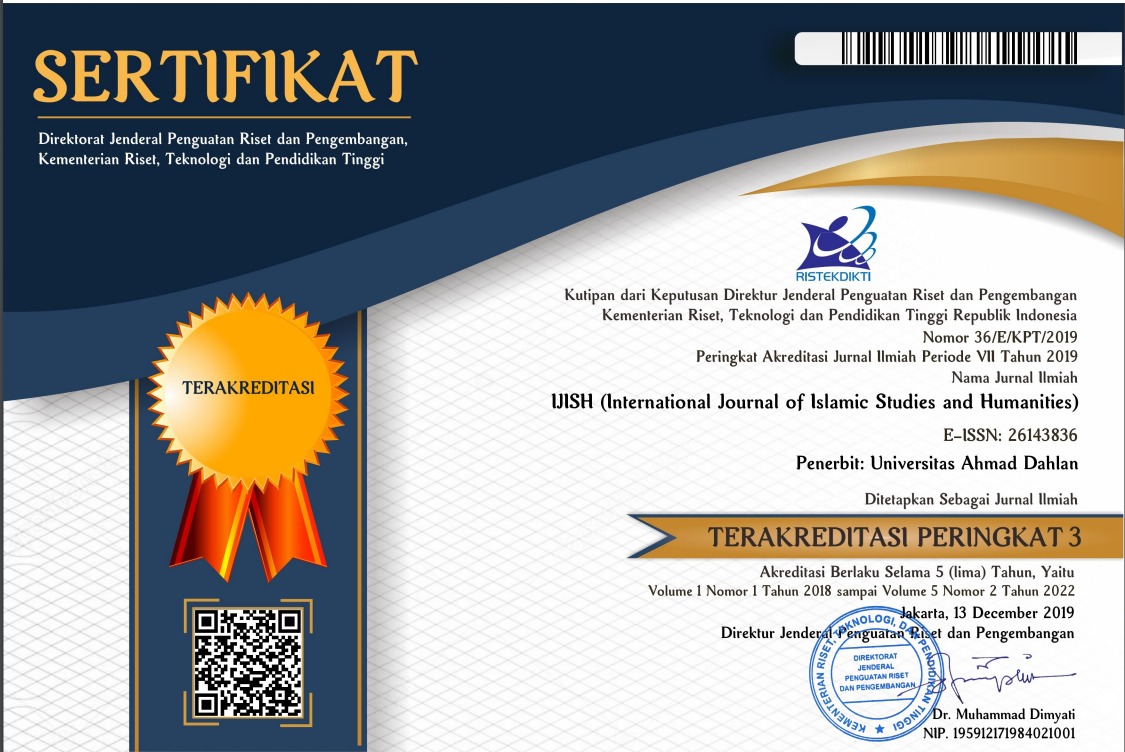The Effectiveness of Health Promotion on the Tobacco Fatwa Issued by Tarjih and Tajdid Council of Muhammadiyah
DOI:
https://doi.org/10.26555/ijish.v5i1.4821Keywords:
Smoking ban, Effectiveness, Health promotion, Tobacco fatwa, The Fatwa and Islamic Research Council of the Central Board of MuhammadiyahAbstract
Given the sensitive issue of tobacco fatwa, there is a need to promote this fatwa through a health promotion. This study aims to analyze the effectiveness of health promotion by the Fatwa and Islamic Research Council of the Central Board of Muhammadiyah regarding the tobacco fatwa that bans smoking. In addition, it also focuses on the portion of health problems compared to other issues in the tobacco fatwa. This research aims (1) To analyze the effectiveness of health promotion by The Fatwa and Islamic Research Council regarding the fatwa on smoking prohibition. (2) To analyze the portion of health problems compared to other issues in the discussion of smoking prohibition fatwa by The Fatwa and Islamic Research Council. This is field research that was conducted using questionnaire and interview methods including a Focus Group Discussion and applying a qualitative and quantitative approach. The research reveals that the Fatwa and Islamic Research Council has not collaborated with related institutions in providing health promotion to its citizens. It is also revealed that the health issue has received a proportional highlight in the fatwa, but the concern is that many Muhammadiyah members are unaware about this fatwa.
References
Fariadi, R. (2019). Kompilasi Fatwa Tarjih: Seputar Kesehatan & Medis (First Edition). Yogyakarta: Suara Muhammadiyah.
Han, M.Y., Chen, W.Q., Wen, X.Z., Liang, C.H., & Ling, W.H. (2011) Differences of Smoking Knowledge,Attitudes and Behavior between Medical and Nonmedical Students.International Journal Behavior Medicine.doi:10.1007/s12529-010-91407.
Harimurti, S. M. (2011). Hubungan antara Perkembangan Muhammadiyah Tahun 1912-1964 dan Tinggalan Arkeologisnya. A thesis, unpublished. Yogyakarta: Fakultas Ilmu Budaya Universitas Gadjah Mada.
Ihsan, M. (2017). Merokok dalam Perspektif Muhammadiyah dan Nahdhatul Ulama. Al- Qadha: Jurnal Hukum Islam dan Perundang-Undangan, Volume 4 Number 1.
Murti, E. S., & Prabandari, Y. S. (2006). Efektivitas promosi kesehatan dengan Peer Education pada Kelompok Dasa Wisma dalam Upaya Penemuan Tersangka Penderita TB Paru di Kabupaten Badung (Universitas Gadjah Mada). Retreieved from http://etd.repository.ugm.ac.id/index.php?mod=penelitian_detail&sub=Penelitian Detail&act=view&typ=html&buku_id=32535
N. M. Abdulhameed. (2021). Ethical Dimension of Maqasid al-Shari’ah and its Implication to Human Capital Development. IJISH (International J. Islam. Stud. Humanit., vol. 4, no. 1, p. 20. doi: 10.26555/ijish.v4i1.2621.
Notoatmodjo, S. (2012). Promosi Kesehatan dan Perilaku Kesehatan. Jakarta: Rineka Cipta.
Oktavia, D. Faktor Internal dan Eksternal yang Berhubungan dengan Tindakan Merokok Siswa Laki-Laki di SMA Negeri Kota Padang Tahun 2010 [A thesis]. Padang: PSIKM UNAND.
Rahayu, D. (2010). Efektivitas Promosi Kesehatan dengan Metode Peer Educator terhadap Tingkat Pengetahuan dan Sikap Remaja tentang HIV/AIDS (S1, Universitas Muhammadiyah Surakarta). Retrieved from dari http://eprints.ums.ac.id/2753/
SARASWATI, L. K. (2009). Pengaruh Promosi Kesehatan Terhadap Pengetahuan tentang Kanker Serviks dan Partisipasi Wanita dalam Deteksi Dini Kanker Serviks (Di Mojosongo RW 22 Surakarta) (Masters, Universitas Sebelas Maret). Retrieved from https://eprints.uns.ac.id/7820/
Saskia, R.R. (2015). Penyuluhan tentang Bahaya Merokok terhadap Sikap Siswa Kelas VI di SDN Gedog Wetan Turen Kabupaten Malang: Malang.
WHO. Who Report on the Global Tobacco Epidemic. WHO, 2011. Retrieved from: http://whqlibdoc. who.int/publications/2011/9789240687813_eng. Pdf
Zulian, P. B. (2015). Fatwa in Indonesia: An Analysis of Dominant Legal Ideas and Modes of Thought of Fatwa-Making Agencies and Their Implications in the Post-New Order Period. A dissertation, unpublished. Singapore: National University of Singapore.
Downloads
Published
How to Cite
Issue
Section
License
Copyright (c) 2022 Shubhi Mahmashony Harimurti

This work is licensed under a Creative Commons Attribution-ShareAlike 4.0 International License.
Authors who publish with IJISH (International Journal of Islamic Studies and Humanities) agree to the following terms:
- Authors retain copyright and grant the journal right of first publication with the work simultaneously licensed under a Creative Commons Attribution License (CC BY-SA 4.0) that allows others to share the work with an acknowledgment of the work's authorship and initial publication in this journal.Â
- Authors are able to enter into separate, additional contractual arrangements for the non-exclusive distribution of the journal's published version of the work (e.g., post it to an institutional repository or publish it in a book), with an acknowledgment of its initial publication in this journal.
- Authors are permitted and encouraged to post their work online (e.g., in institutional repositories or on their website) prior to and during the submission process, as it can lead to productive exchanges, as well as earlier and greater citation of published work.

This work is licensed under a Creative Commons Attribution-ShareAlike 4.0 International License.






